#disney analysis
Text
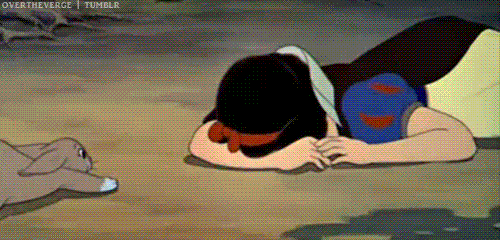
I love the comments and defense of the original Snow White but some people are not taking the defensive position that I would take, all things considered.
I mean, asking the question “since when is it bad to wish for love?” is one thing, but then sometimes people follow it up with, “and that’s not all she wanted! That’s not her main goal!”
Okay I appreciate you but yes it was. Let’s just call it like it is. And then don’t back down. Hear me out.
The first thing you learn about Snow-White is from that pretty opening-fairy-tale-book page, where it points out two characters: the wicked and vain stepmother who is afraid of Snow White and dresses her in rags to cover up her beauty, and uses her as a scullery maid—and Snow White herself, who is…well, used as a scullery maid.

Treated as a servant, and actively hated by the only family she has. And she’s a child. She hasn’t been alive very long to experience anything other than hatred and jealousy toward herself.
She’s even talking to birds, and the fact that they’re clustered around her from beginning to end of that opening scene indicates that they’re very comfortable with her and she talks to them all the time—because they’re the only positive interaction she gets to have.
That’s the situation that Snow White is in. But the first thing you learn about who she is and what she wants comes when she wishes in the well. And what’s she wishing for?

Love. The one she loves. A specific, male figure, who will say nice things to her and find her. She wants him to come quick. Why?
How silly. How vapid and shallow of her. How weak and one-dimensional. Please, goodness, can’t someone update her to have some depth?

NO.
She is a young woman who is not given any love and is treated like a horrible nuisance who must be covered up in dirt and rags. She has no friends except birds, who can’t talk back. She is actively hated by the closest person to her.
It’s a miracle she even knows the word “love” and has the strength of character to believe in it after the situation she’s grown up in.
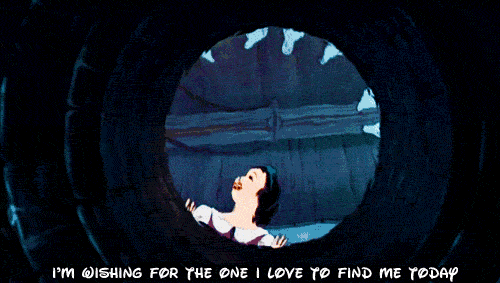
The song very specifically says “I’m wishing…for the one I love…to find me…today. I’m hoping…and I’m dreaming of…the nice things…he’ll say.”
She wants to be loved because she isn’t loved. Geez, she wants someone to say nice things to her. She wants to give her own love because she doesn’t have anything but courtyard doves to befriend. Of course it’s her goal. Of course it’s her wish. What wish or goal could be higher? And what wish or goal could be more natural for a character in her situation?
And even more than that, what could be stronger than believing that it will happen? This character who’s been unloved and mistreated by everyone takes a Prince at his word when he says he’ll give her that love. He promises it, and she believes him.
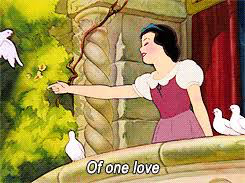

She has every opportunity and right to be bitter, hardened, anti-social, self-absorbed (pre-Huntsman and Dwarfs, she could very easily believe that nobody else is going to watch out for her except herself) and jaded. But instead she has this pure faith, which it takes a lot to maintain when everything has been ripped away from you. She could’ve been totally swamped by doubt and bitterness.

I mean, she could worry that the Prince won’t be able to convince her Stepmother to let him marry her.
Then when she gets chased into the woods for her life, she could fret that the Prince wouldn’t know how to find her.
Heck, she could just forget about him, give up, and say, “this is my life now, I’m living with these seven dwarfs and we’ll take care of each other, I guess that’s the most I can hope for.”
But no. She has faith in his promise, and hangs on to her dream, and sings, with total assurance, “Someday My Prince Will Come.” I mean, she won’t even let a moment of panic in the woods go by without reprimanding herself for losing that faith, for a second.
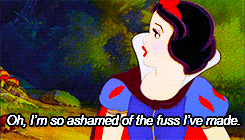
Can any of you say the same? Can any of you imagine being that kind of person: the kind of person who unashamedly wants to love and be loved in return, and when everything is stripped away and every chance at that taken from you, you hang on and believe anyway? You stay positive and even joyful anyway? For love?
Come on. Defend that. Yes, her goal was “just” to be loved. And to love in return. The fear of having her life taken from her, the necessity (not the desire for) freedoms from that, was just an obstacle in the way of being loved. And this isn’t a movie about Snow White’s natural reaction to abuse. It’s about her strength of faith in love in SPITE of that abuse. The spotlight is on her strength, not her weakness, but it’s strength of faith in love.
Anyway.
If you believe that it’s good and fine for a girl’s whole goal and fondest dream is to be loved, then don’t stand with one foot in that camp and another in the camp that says “girls want more than just love.” No, what? Love is the best thing a girl can want. I’m not talking about “romance.” I’m not talking about sex. I’m talking about pure, self-sacrificial, kind love. It’s the best thing they can want, and Snow White is one of the only characters who does want it unashamedly, uncomplicated.

Just defend that. Don’t try to argue that the “Someday My Prince Will Come” Princess isn’t wholeheartedly after love. Makes it look like you don’t believe that’s as wonderful as it is.
#Snow White#Snow White 1937#Snow White 2024#Snow White and the seven dwarfs#Snow White and the seven dwarfs 1937#Walt Disney#classics#love#discourse#meta#analysis#Disney analysis#Snow White defense#Rachel Zegler#gal gator#greta gerwig#Disney appreciation#snow wh appreciation#Snow White hate#true love#self-sacrificial love
1K notes
·
View notes
Text
Vanellope VS. Turbo: A Mini Analysis!
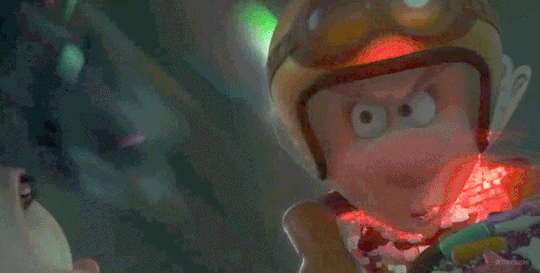
There are a million reasons why Turbo’s reveal in Disney’s Wreck-it Ralph is such an iconic and memorable scene. A scene that I and many others have replayed ever since 2012 and its impact has never left our minds. It solidified King Candy/Turbo as one of Disney's top villains ever created, surprising and shocking viewers with a plot twist that Disney hasn’t been able to overthrow with their other movies before they abandoned villains until King Magnifico but he sucks so. He WISHES he was as charismatic as King Candy plz-
But this analysis isn’t just about King Candy/Turbo, it’s also about Vanellope Von Schweetz. She’s the most important ingredient to making this scene work and play out the way it does and ultimately why it’s so fucking cathartic. ( More so than Ralph’s fight against Cy-Bug Turbo in my opinion) After watching how it was originally story boarded, the crew behind WiR perfected this scene with a specific detail that they changed. In the early storyboard, Vanellope causes King Candy’s vehicle to crash, causing him to glitch and transform into Turbo in front of the cameras. While I love love love the extended race between Vanellope and King Candy and sort of wished it could have been longer in the actual film, I am content that they didn’t go with the direction. In the movie, King Candy is revealed after trying to beat/kill Vanellope with his horn rod/pole thingy from his kart, she grabs it and glitches due to stress/adrenaline/her emotions, her blue glitch traveling through the cane and making contact with King Candy, finally putting down the facade he had on for 15 years and revealing him as Turbo to the characters in the film and the audience. It’s such a small detail, it only happens in a second, but it’s all it took for the start of his downfall and his eventual demise.
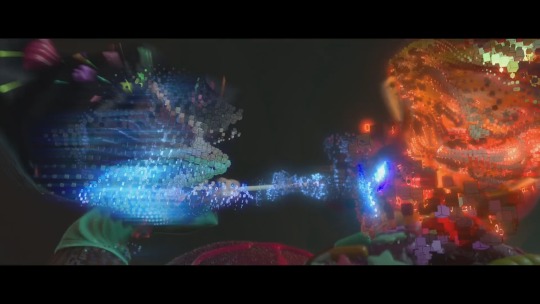
And this is why it brings me catharsis every time I watch this scene. I could never put it into words before, but it’s beyond satisfying that the end of King Candy’s horrible reign starts with Vanellope and her glitch. The very same glitch that he caused trying to delete her code and remove her place from the game. The glitch that he used as an excuse to turn everyone in Sugar Rush against her. He usurped her throne and tried to ruin her life. Despite this, he still had the audacity to shout “Get off of MY track!” earlier. It brings his Roadblasters incident back up, it was his choice, trying to steal the thunder of another racing game that just got plugged in because he couldn’t stand the idea of anyone taking his place, only for Turbo Time and Roadblasters to be unplugged. All of this circling back and biting him in the ass. Vanellope was the key all along and he knew it, he feared her despite never really having a conversation with her as far as we know (Vanellope asking Turbo “What the-?! Who are you!?” leads me to believe that if they did converse in the past, it was not in his true form and he was most likely already King Candy. Plus it just goes to show how fast he hijacked Sugar Rush), but you can just tell by how desperate he was to keep her from racing, he didn’t want anyone to take his place ever again.
So the scene continues and his famous line and breakdown goes as this: “I’m Turbo! The greatest racer ever! And I did not reprogram this world to let YOU and that halitosis riddled warthog TAKE IT AWAY FROM ME!” It’s just so ironic, unfair and hypocritical of him it makes my blood boil! And the way he’s raising his voice, jabbing his finger at her and Vanellope’s trying to shrink away from him as he yells at her face before he tries to murder her I just- So cruel, scary, wicked and disturbing! But Vanellope, this brave WARRIOR, is reminded of her glitch after Turbo calls her for what he believes is the last time. “End of the line, Glitch!” She takes a moment, everything slows down around her as she tries to control her glitch to escape Turbo. She glitches away, missing the wall and It ends up saving her life! I just cannot stress enough how beautiful that is! She used her disability, that everyone thought would simply doom her and the game, and embraced it when she needed it most. Her glitch, while it was suddenly given to her by circumstances she couldn’t control or prevent, she took control back. It’s her beautiful superpower and it’s empowering. After this scene, it’s the “end” of Turbo before he gets nom’d by a Cy-Bug. ( I want to note that he later says “I’m the most powerful VIRUS in the arcade”, part of me wants to believe he said that because clearly Vanellope bested him as the greatest racer ever but I doubt that was their intention lol)
They’re the embodiment of Selfishness vs. Selflessness. While Vanellope had everything taken away from her, she didn’t follow the same path as him. Turbo had everything taken from him, but it was his fault and he only ever thought about himself, never about the destruction he left behind. Hell, all she ever wanted was to be one of the racers, no matter how much they bullied her and ostracized her, she never ended up being evil like him even though it would be a perfect recipe to become a villain, this is also what makes her a mirror to Ralph. (Remember in that one deleted scene where she said she wanted to break the racers’ legs but come on can you blame her!?!?! She was so real for saying that.) VANELLOPE IS MY FAVORITE CHARACTER EVER AAAA.
Before I ramble any further, I will forever love the choices that the writers made for the climax and it just ends up being an absolutely perfect and brilliant scene and I will continue to rewatch for the millionth time.
#I cannot properly write analyses okay my ADHD brainlimits me plz#Ijust hope this makes sense and ty for whoever reads this#WIR analysis#Wreck it Ralph Analysis#WIR#Wreck it Ralph#Turbo#King Candy#Vanellope#Vanellope Von Schweetz#putting it into words it seems obvious because its literally whats being shown but its so powerful and its driving me crazy i just have to#WRITE ABOUT IT#After a little more than a decade I will always be obsessive about this movie nothingwill change that#part of me thinks i wrote too much but also too little man this sucks#disney analysis#ramblings#rambles#i find vanllope vs turbo so interesting because they have 15 years of anger but they hardly ever talked and its just the actions alone and#reck it raph fave movie#vanellope is my hero#turbo tastic
56 notes
·
View notes
Text
Okay so I saw Wish last night and I have some thoughts. Spoilers below!
The movie wasn’t bad. It wasn’t particularly good either though. It had all the elements that should have made a great Disney movie but it fell flat. And I think it all stems from the way the movie is so non-specific.
First, the world building. King Magnifico built a kingdom where everyone would be safe in exchange for giving him their wishes because…….. something bad happened to his family when he was young? And it prompted him to learn all the magic in the world and become the most powerful sorcerer so that he could…..NOT grant everyone’s wishes? We weren’t given enough background on the kingdom and the way it functions to have any kind of emotional impact in the end. Why does everyone agree to give up their wish? It seems like a raw deal. And also why does everyone only get ONE wish their whole life?? And if the wish is the best part of the person and they give it up, shouldn’t everyone over 18 be like Simon? Boring and sleepy and wish less? But this does not appear to be the case. It’s all too vague and muddled to make much sense.
(On a contrary note, I actually thought Chris Pine as Magnifico was the best part of the movie. You could tell he was having a lot of fun with it, even though the character was so shallow! I’m happy about a return to traditional Disney villains, even if this one wasn’t the best example of it.)
Okay, then there’s the music. It was bad. It was like a pop rip off of Lin Manuel Miranda but with terrible lyrics. (“When it comes to the universe we’re all shareholders”?? SHAREHOLDERS?) None of the music seemed to take inspiration from its vague Mediterranean setting and even the big I Want song was bland. In This Wish Asha sings “I wish for more for us than this.” Okay? So uninspiring! In all other Disney movies you know exactly what the mc wants and why they want it. Ariel wants to be humans because she feels trapped and misunderstood under the sea. Belle wants an adventure because she feels she does not fit in in her small village and she longs for her life to resemble the fantastical stories she reads. Mirabel wants magic so she can fix the cracks in her family. I could go on. Asha wants everyone to get their wishes granted because her grandpa is 100 and hasn’t gotten his wish granted. Very noble. But his wish kinda stinks—he wants to inspire people but we’re never told why or in what way. We never find out what Asha wishes for before she learns about Magnifico. She’s just a cookie cutter heroine with a mix of likeable qualities—loves her friends and family, adorkable, passionate—that all add up to a lot of nothing. She could be any one of us watching, I guess, but the thing that truly makes characters complex and relatable is specificity. And Asha is as vague as they come.
Then there are the other characters. None of them are developed enough. Her friends are the seven dwarves basically, but none of them grow past their one-word personalities (bashful, grumpy, sneezy, etc.) except maybe Simon, but even that isn’t really explored. There are too many of them and none of them are distinct. The goat is whatever. The star is adorable (though I’ve seen the concept art for the star boy storyline and I’m so upset we didn’t get that movie! But that’s a whole other post). The queen could have been interesting, but we never got any backstory on her. How and when did she fall in love with magnifico? What were her plans for their kingdom and do her hopes and wishes mirror what the kingdom has become? Asha’s mom and grandpa were just kind of there. And…. That’s it’s really. No one and nothing stands out.
The end was non specific as well. The people are inspired by the whole “we’re all stars” thing but they weren’t even there for the song the woodland creatures sing to Asha so how come all of a sudden they are so into this idea and it saves them when it never came up for them before? It should have been an emotional gut punch moment but it just felt rote and predictable. I didn’t feel any sense of triumph for any of the characters. There was no real magic behind it. Asha is given a magic wand and the king becomes a magic mirror and that’s it, the end. Overall it was very disappointing and I found myself bored in a lot of places.
I’ve read a lot of critic reviews and the one thing that I disagree with is the references to other movies. They didn’t bother me like they seem to be bothering others. Some of them were silly and over the top but like whatever. Even though they didn’t bother me they added absolutely nothing to the movie or my experience watching it 🤷🏻♀️
#non Star Wars#Disney#disney wish#wish#wish movie#chris pine#asha wish#king magnifico#spoilers#disney analysis
46 notes
·
View notes
Text
Sally Flower Symbolism??🎃💀
So I was watching The Nightmare Before Christmas, cuz is spooky month of course. And every time I do I get kinda stuck on the flowers Sally uses for her premonitions.
Now, I did go looking, and nothing I could find is even certain Sally has this power. Any wiki page for her writes it off as only happening once so it's not certain, and the novelization says this
"Now she sat at the town gates, wondering what the future held. Well, there was one way to find out. Sally picked a flower and began pulling off its petals one by one. "He loves me, he loves me not," she whispered. "He loves me. He—" Suddenly the flower in Sally's hand did something very strange. It began to twirl around, then changed into a miniature Christmas tree! Sally stared at it, not knowing what to think. Did this mean that Jack didn't love her? Or was it a an omen about his plans for Christmas? She just didn't know. Suddenly the tiny tree burst into flames and disappeared, leaving Sally cold, confused, and completely in the dark."
Either way, what kind of flower is it she picks anyway?
Well I don't actually know. Nothing anywhere says anything about the species. The passage above doesn't say anything about what the flower looked like or anything else. Just "flower" so what does it look like in the movie?
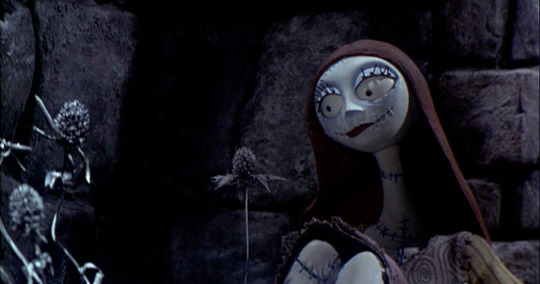


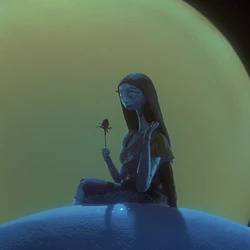
Surprisingly, it's not very generic looking at all. Off the top of my head it looks very much like sea holly to me. But it also looks very much dead... which tracks for Halloween town, so maybe it's a dead coneflower?


Sea Holly on the left, dead cone flower on the right
And since I've seen people make this confusion lately with these plants, it's not a thistle. it's 100% not a thistle.


This is what a thistle looks like alive, and dead.
Anyway, according to atozflowers.com
"Eryngium(Sea Holly's genus) is a symbol of independence, severity and attraction."
Where as coneflower
"Echinacea(Coneflower's genus) symbolizes strength and health."
By this logic I'd be more inclined to think it's a Sea Holly. But If I'm totally honest, I don't actually think the people who made the movie meant for it to be a certain kind of flower :p. Just a spooky looking one.
21 notes
·
View notes
Text
A friend of mine it's working on her film production degree and it would be great if you could fill out this survey to help her collect info for her thesis, thanks in advance if you do! 🤗
Tagging some mutuals to get the word around (:
@enchantedlandcoffee @wendersfive @onesweetworld18 @alivingfire @tomatoesarefroots @ninemagicks
#disney polls#(not really but meh)#disney villains#queer coding#gender stereotypes#disney analysis#(kinda)#film studies
10 notes
·
View notes
Text
Usually whenever I see people say “Alma didn’t directly apologize to Bruno”, I go…..yeah you’re right, but I feel like a lot of people are forgetting this moment.
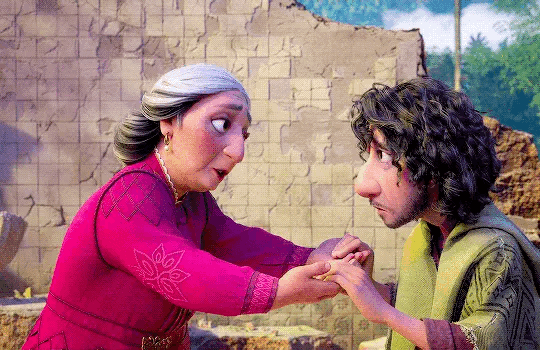
After Alma realizes her faults, she comes back to the broken casita with Mirabel, and sings towards the whole family, but more importantly, she welcomes Bruno back. She takes his hands, looks him in the eye, and shows him that she NOW knows her mistakes and that every member here is worthy, (including him of course) and that their gifts aren’t the miracle. It’s not a flat out apology towards him specifically, but she herself told the whole family “I’m sorry I held on too tight”. She welcomes Bruno, immediately hugging him, and she shows everyone that her eyes are open and her outlook has changed, and that’s a good thing! So even though she never specifically said “I’m sorry Bruno”, that doesn’t mean she’s being in-denial of what she did and shunning him out, it’s the opposite in fact. Of course, they’re probably not going to heal quickly, they have a lot to talk about, to make up for lost time, and I think the writers are smart enough to know that. When the family rebuilds their house, it isn’t just them saying everything is okay, it’s them admitting that they have made a new foundation, and that in time, they’re all going to heal, expect they know NOW that they’re not alone, and that they can all work together to be better. Just like the directors have said, family can be messy, and it’s going to be messy from time to time. However, that doesn’t mean their isn’t light, isn’t hope for a better way, a better life. While some have wished Mirabel or Bruno would cut off Alma, this movie teaches you not to FORGIVE your abusers like a lot have been saying, but rather teaches you that anyone is capable of changing, anyone is capable of getting better, of BEING better, of healing and growing as people, as a family than they once were. Everyone has their own demons, their own faults and imperfections, but that doesn’t mean all hope is lost, or that their can’t be a reconcile. And even if you don’t agree, or don’t think the film handled a message like this well, hopefully we can all agree that this movie is certainly a good START when talking about these complex themes towards kids and adults. 💚❤️
#encanto#jared bush#walt disney animation studios#disney’s encanto#lin manuel miranda#mirabel madrigal#walt disney#bryan howard#disney animation#encanto mirabel#bruno madrigal#Encanto Alma#Alma madrigal#encanto movie#disney characters#Disney analysis#generational trauma#themes#encanto themes#Abuela Alma#Encanto Bruno
220 notes
·
View notes
Text
even for a disney movie tangled takes a pretty random but enjoyable departure from the original fairytale and i do think that's because another prince character just wasn't cutting it and they decided to incorporate the gentleman thief storytelling tradition instead. the art design and miyazaki loving team behind it pretty overtly tells me the idea for that change came from the castle of cagliostro and a deep appreciation for it.
and me? personally? I WOULD rank cagliostro one of the most sincerely moving and aesthetically enchanting but also actiony fun movies about a princess ever animated and somehow it's not trying too hard to be ironic or hip or something. I feel like it's an obvious choice for study when trying to make a tricky script adaptation work when it is calling for the upbeat fight sequences and genre aware clever subversions but still needing to sincerely remain a pretty princess story in a magical land that does actually celebrate the spirit of fairytales and trying not to skimp too hard on any aspect
the original script for the rapunzel adaptation before lasseter took it over btw was a sort of fish out of water body swap modern day disney princess parody situation banking off the success of shrek. that was imo directly reworked as Enchanted. and much better utilized that way too
tbh in seeking a good solution to the new but not too new direction for disney, post-potf critical acclaim for returning to roots of sincerity but pre-frozen box office sensation, still seeking that dreamworks and pixar level of market domination. there was a very happy tonal medium to be found in cagliostro and it's success does suggest what something like that could do in a market looking for more modern, self aware and action packed takes on princess movies. a market that was already responding well to the dubs of other miyazaki directed movies disney was distributing.
castle of cagliostro does deconstruct fairytale stories and notions and princess movies, but does so much more lovingingly earnestly and whimsically, with a lot of affection for the source material compared to the cynicism of shrek. which as heart felt and genius as it is , wasn't something the disney company could pull off and maintain their brand.
there is nothing but sympathy for the kind of idyllic childhood notions of heroes and fairytale castles present in older disney movies, because clarisse herself holds onto those notions to help her maintain hope when escaping her situation. lupin plays into it too with some irony but not in a way that mocks her, just lightly mocks himself. it's a movie about how the real world can be really hard and at times you WILL face things that are insurmountable alone because that's normal and part of being a real person with normal limits. and asking for help from kind people isn't a weakness but part of life, a beautiful part of life even.
i've actually never seen a damsel in distress storyline portrayed as so human and understandable and not shameful. nor as a mark of being incapable but a role we all play at some point. it directly signals those who are most capable at the time to heed those around you. for what the hell else are all those skills and power youve got good for in the first place. DO be aware of those who are currently drowning in a situation no one should be expected to magically just surmount or suffer on their own and DO take action. it's your job
i love the castle of cagliostro down to my very core because I think it manages to express innocence wonderment as a strength of the soul even when juxtaposed against the complexities and realities of the often harsh present day adult world. and does so even more gently and optimistically than other similar hits like shrek and princess bride. in that sense it's too perfect for any modern disney filmmaker to NOT find inspiration in. anyone would be happy to look to it as one of the examples of how to make a fairytale adventure feel updated, cool and self aware but still maintain its palpable respect for those who love innocence and wonder.
#lol funny horse post becomes 7 paragraph essay sorry#castle of cagliostro#lupin iii#miyazaki#animation history#disney history#anime history#the castle of cagliostro#tangled#disney analysis
38 notes
·
View notes
Text
Wall e is a wildly praised movie,it's far from underrated but I always felt like one of it's messages is overlooked
While capitalism and pollution are the main themes in the movie there was another one that was shown more subtly: breaking free from programming and expectations
Wall e himself was created to clean the earth,however over the time he developed one little glitch; a personality. He's expressive,collects things that he doesn't turn into a trashcube,has a home and is friends with a cockroach
Then we have our deuteragoinst eve, when we first met her she showed us that she isn't just an emotionless robot, the moment eve saw the ship that brought her on earth leave she started flying and goofing around
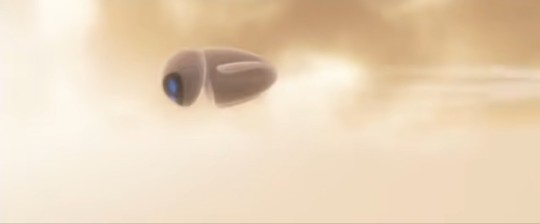
As the story progresses we see more of her anger issues and her destructive behavior after she found no results for her mission
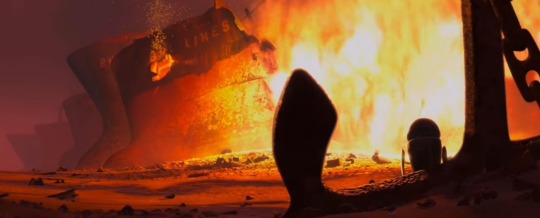
She also never returned wall e's feelings until this scene

This is the most important scene for eve,the way she throws the plant shows how much she developed,she spent the entire movie wanting to complete her mission but here she just wants to be with him (it was the best idea to switch the roles since she was supposed to be the one who got hurt)
There are also the reject robots who are considered to be unacceptable simply because they don't work they way they're expected to. It could be argued that they're actually the smartest ones on the ship because of their ability to think outside of the box,they also helped wall e and eve in the end, including mo; despite being a comic relief he went out of his way to clean up wall e's mess,even making a mess himself; this shows how a robot that was designed to be perfect could show a great amount of personal and change
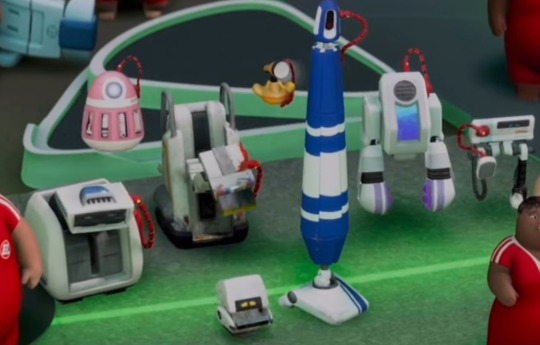
Remember the typing robot? After wall e waved at him typ-e starts to the same hesitantly,as if he had no idea he could do such thing. When wall e comes back he excitedly waves at him
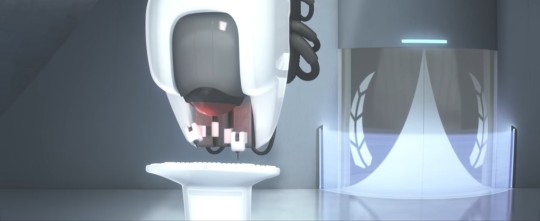
There also a few human characters that have the same role,another romantic pair who at first were just like the rest of the people on the ship but started to finally see the world around them. What encouraged them to change? Wall e's enfluence

And of course the captain and his obvious development,he started off as a lazy guy who could've cared less about earth and focused on the space ship because that was what he was supposed to do, that's what the previous captains did. But after learning about the earth after wall e left some dirt on his hand he decided to step up and do the right thing.
And the movie's main storyline: two robots falling in love. Robots showing emotions is unexpected it's,but them falling in love? Who would've guessed!
All of the characters change throughout the film except one
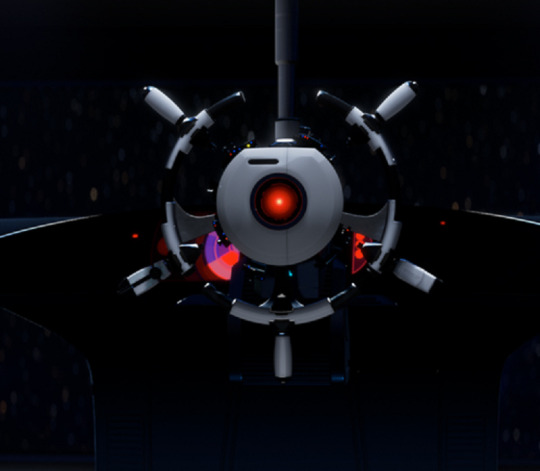
Auto is probably the most "robotic" character
He's emotionless and does what he has to do,whenever you see people talk about him there are a lot who say that he really wasn't a bad guy because he was just following his programming; we've seen how wall e unknowingly changes the ones around him but even when he tried to stop auto he failed. Nothing could've changed auto because of how firmly he followed his programming
#pixar#pixar movies#pixar walle#pixar characters#disney pixar#eve wall e#wall e and eve#wall e auto#auto#eve#disney movies#disney#disney characters#disney analysis#movie analysis#wall e
114 notes
·
View notes
Text
Simba Is A Good Dad, to BOTH his Cubs, Actually.
So I’m about to rant about some shit that nobody is gonna care about considering it’s about an almost 20 year old movie and a cartoon that’s technically over(?) but I need to get it out of my system
One of the coldest takes (in my opinion) on the internet I’ve seen since dabbling in the TLK/TLG fandom is that Simba isn’t a good dad to Kiara, hypothetically compared to Kion his younger son especially.
Granted he’s not a perfect dad, nobody is, and I mean, he’s got some big shoes to fill regarding Mufasa as a king and as a father. Then again, we never got the chance to see him really mess up because he never had the chance to see Simba grow up or the challenges that come with that tragically.
But like, Kiara is like under 10 years old at the TLK2. He’s protective of her then, sends Timone and Pumbaa to watch her (like Sarabi sent Zazu, not really that different).
She deliberately loses them and almost gets eaten by crocodiles and encounters someone who very well might’ve killed/kidnapped her given the opportunity, Zira.
Then the scene that follows mirrors the scene from TLK where his father chastised him for putting himself in unnecessary danger and gives him a narratively potent lesson about the Circle of Life.
He overreacts a bit at the prospect of Kiara being out in danger. But the thing is he doesn’t do it for no reason. Yes there’s past trauma there from his childhood, but because of the Outlanders the Pridelands aren’t as safe as they were when Simba was a cub.
Kiara doesn’t look for trouble, trouble finds her because there are factions willing and able to exploit the fact she’s Simba’s only heir (especially with Kion absent). Both times Kiara went out on her own the Outlanders used her against him and she almost died the first time. Even though he freaks out initially and is like “no more hunts for you!” he still lets her go out alone with Kovu.
He doesn’t know what the audience (or Kiara) knows about Kovu. His worst fears were confirmed and his reaction to Zira (and seemingly Kovu as well) using Kiara to get to him was to protect her. He’s ultimately in the wrong and is stubborn, but he does learn in the end and apologizes to Kovu for misjudging him instead of doubling down. He’s an okay dad and becomes a better one by the end of the film.
So how does this relate to Kion? Well the arguement I’ve seen is Simba not being as protective/showing favoritism to Kion over Kiara in TLG.
I strongly disagree. I think Kiara and Kion are very different children with very different responsibilities. Plus by TLG they’re both older than Simba or Kiara at the beginning of their films.
Kiara is princess regent, the next in line to the Pridelands throne, this a bigger target than Kion, a bigger target who also has more complex responsibilities.
In the TLG pilot, Simba is about as overprotective and mistrustful of Kion as he’d been with Kiara, he still lets him play, he’s an older cub and isn’t alone (because Bunga).
Then it turns out Kion has the Roar of The Elders, and has an entire group of friends he’s assembled and travels with. Not only does tradition (something Simba holds in VERY high regard) demand his son lead The Lion Guard, he also has a group of friends who can and do protect him. He’s not going around all alone with no protection (be it ancestral gifts or allies) picking fights with Hyenas just because he wants to.
I’m almost certain that had Kiara been the one with the Roar of The Elders, Simba would have a hard time justifying keeping her cooped up. And as we can see, Kiara isn’t quite as cooped up (even in TLK2) as people tend to project.
They’re different kids with different needs, personalities, and Royal duties. Simba, in my opinion, reacts pretty reasonably (if not perfectly) to each of those individual cubs given the circumstances. Parenting isn’t easy, especially if you’ve got trauma and there’s a lot at stake.
TL:DR, cut Simba a break, he’s doing his best, and his best really isn’t all that bad, damn.
#the lion king#the lion king 2 simba's pride#the lion guard#tlk#tlk2#tlg#simba#Kiara lion king#Kion lion king#Disney#meta#meta analysis#character analysis#disney meta#disney analysis#Lars rambles
99 notes
·
View notes
Text

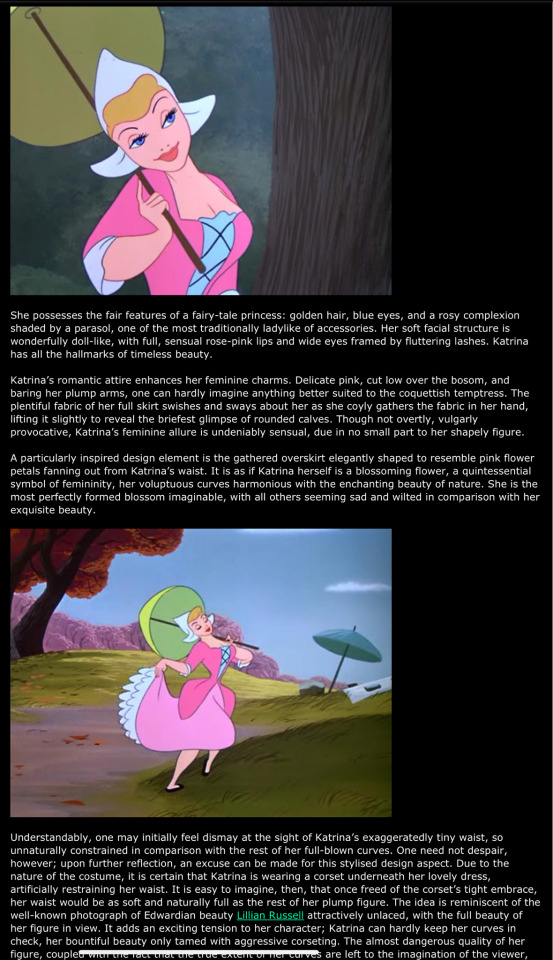
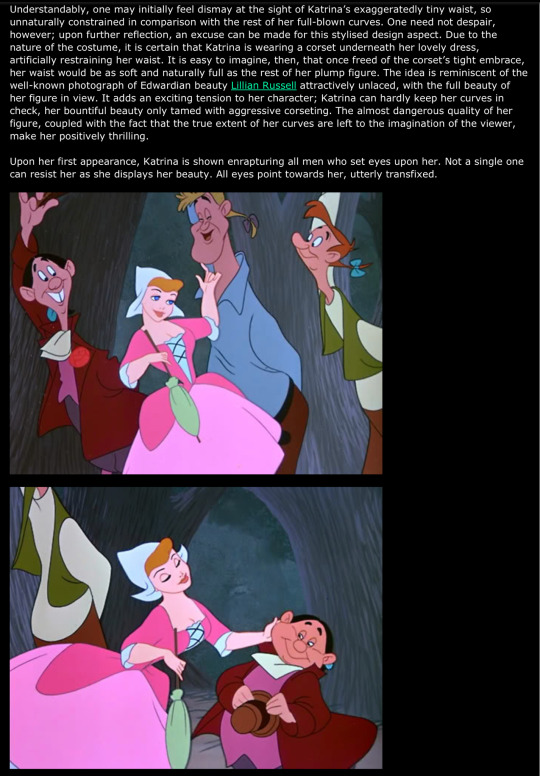



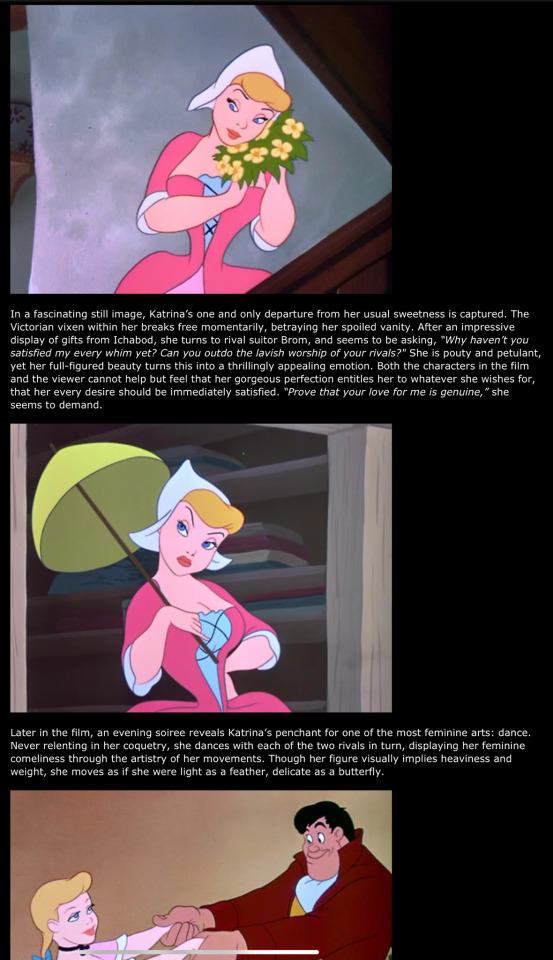


Katrina van Tassel is a criminally underrated Disney "princess."
Source: https://web.archive.org/web/20120608112436/http://www.judgmentofparis.com/board/showthread.php?t=2335
#halloween#disney#disney analysis#legend of sleepy hollow#american gothic#disney princesses#classic disney#femininity#plus size#physical beauty
5 notes
·
View notes
Text
To this day I am still blown away by Mother Gothel’s writing.
They somehow managed to simultaneously make me laugh at all of her jokes and also make me feel extremely uncomfortable and tense every time she’s on screen, in a very specific way that only a manipulative mother like herself could do.
The banter between her and Rapunzel felt really one sided, it felt less like Rapunzel was cracking jokes because she was comfortable around her and more like she was just doing it so that she wouldn’t get angry at her.
And the whole “stop taking everything so seriously” thing that she does whenever she takes a jab at Rapunzel’s self worth was really painfully familiar and I’m certain that whoever wrote her dialogue definitely had a strained relationship with their mother at best.
Disney did a pretty good job on a lot of things in Tangled, but Mother Gothel in particular still really stands out to me.
#tangled#rapunzel#mother gothel#parental abuse#parental neglect#mommy issues#disney#thoughts#media analysis#cartoon analysis#disney analysis
36 notes
·
View notes
Text
Snow White and Treasure
While I’m on her topic.
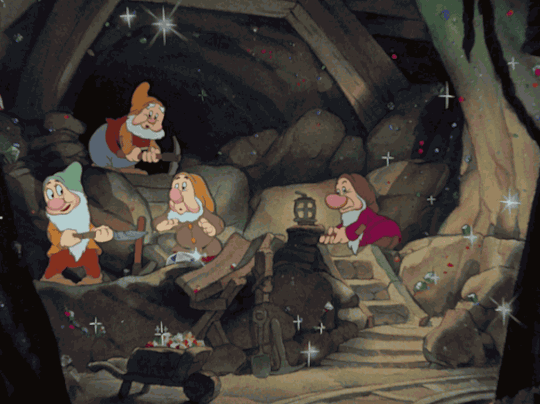
I noticed treasure in my re-watch of Snow White and the Seven Dwarfs. Every key character’s treasure reveals their true nature on the inside.
Nowhere is it more evident than in the Queen herself, obviously.
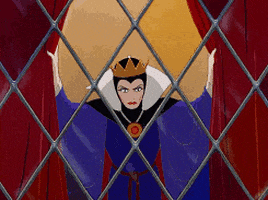
Her treasure is holding the title of Fairest of All. That’s what she cares about. How she’s perceived. After all, why else does she sneak out of the castle through the catacombs? Why does she have the Huntsman do her dirty work—why not just kill Snow White on her own? She clearly gets way too much joy out of the idea of poisoning Snow White.
But she can’t do that. She has to hide her true nature, so she sneaks out of her own castle.
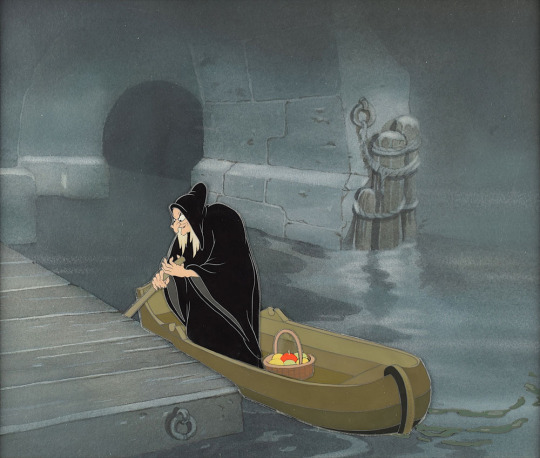
Ironically, her treasure is Being the Fairest—but she’s not beautiful on the inside. She’s ugly on the inside, like a rotten apple! And that fixation on getting her treasure eventually puts that ugliness on the outside, no matter how much she wants to look the opposite.
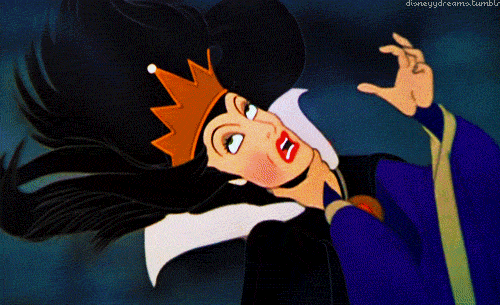
The next character we have who’s treasure reveals his true nature is Grumpy. (My favorite.)
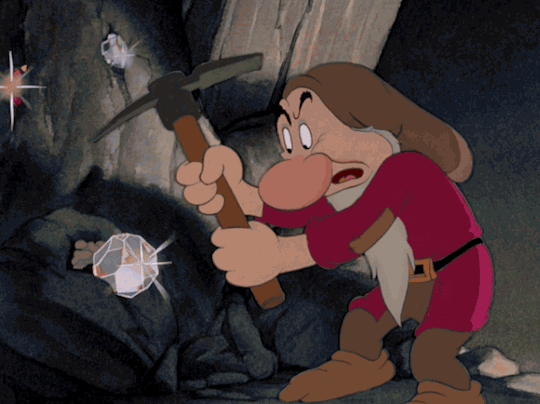
All of the Dwarves treasure their own comfort to some extent. But Grumpy doesn’t just treasure comfort. He treasures his own safety.
After all, what is grumpiness if not a person who has been afraid and self-protective all their life? He’s always defensive, always on the lookout for a scam.
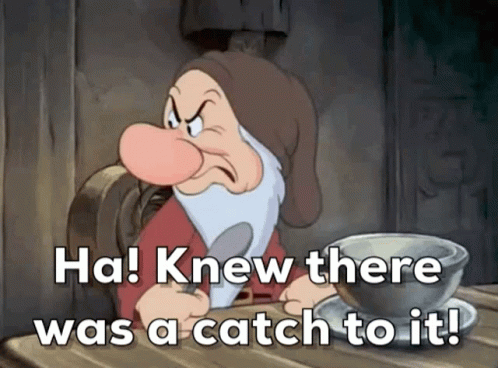
Grumpy is the last to change…and the only one who’s true nature is revealed when he does. Also, Grumpy is the only character who’s treasure changes.
Grumpy starts out being the most against Snow White. All of them are, at first, until they interact with her and she shows them what she can do for them.
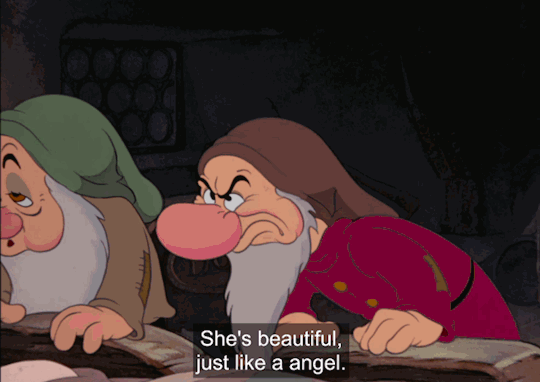
But Grumpy takes the longest to warm up, because he’s not just afraid that she’ll bring the Queen to the cottage and put him in danger. He’s afraid of feelings. They make him feel unsafe.
I know that sounds weird but seriously. That’s his big beef with Snow White. He clearly likes her in spite of himself, but he’s terrified of opening up, because she’s A) new and different and B) getting attached is vulnerability, and vulnerability is dangerous.
That’s the opposite of Snow White! When she’s being her most vulnerable about her wish, he’s meeting the whole idea with scorn: “Ha! Mush!”
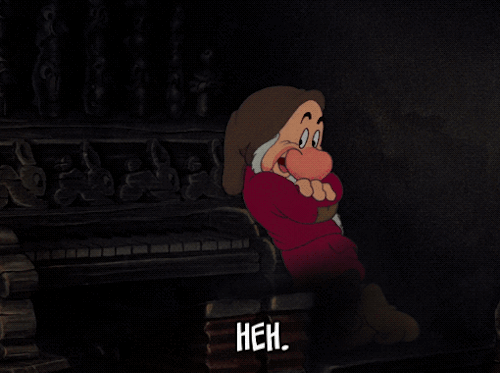
But he can’t help feeling, anyway. Because Snow White is so pure, and so not defensive, she gets under his skin.

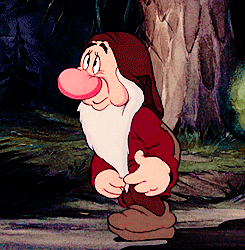
And his treasure changes.
He goes from saying “get rid of her, she’ll bring nothing but trouble” to LEADING THE CHARGE to save her from the Queen.
He goes from treasuring his own safety to treasuring Snow White’s safety.
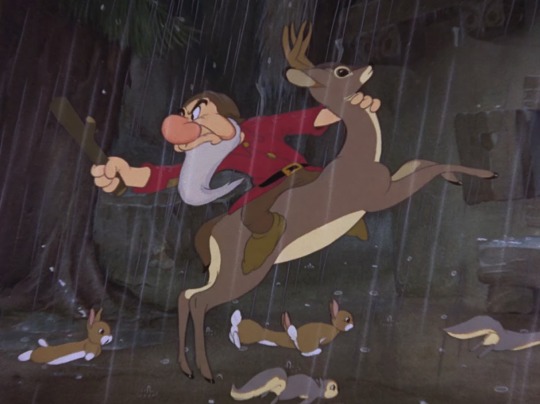
And that new treasure reveals his true nature: Grumpy is sentimental, and feels things strongly. Who is the Dwarf crying the hardest when Snow White dies?
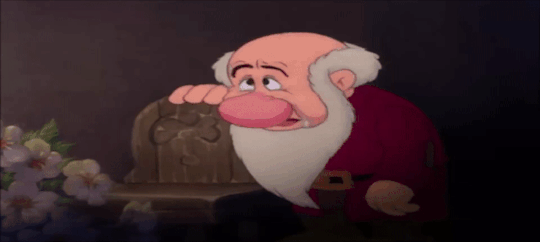
Those two characters show that one’s treasure reveals their true nature, no matter how they try to guard against it or hide it.
The Queen’s treasure of her own appearance reveals that she’s ugly on the inside.
Grumpy’s treasure of safety reveals that he is very vulnerable on the inside.

But Snow White? Snow White’s treasure is not defended. Snow White’s nature is not hidden. Because Snow White is utterly innocent and pure. She just is who she is, beautiful and simple, and that’s what so great about her.
She treasures love—and she is loving. She tells the birds at the wishing well, and sings out her wish, for love. That’s rewarded; the Prince hears it and promises her his heart. (She’s his treasure by the way.)
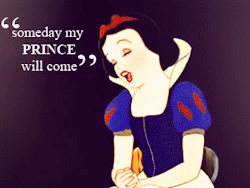
She tells the Dwarves that she’s got faith in his love, and she knows he’ll come back, and they just adore her.
She’s every bit as beautiful and vulnerable on the outside as her treasure of love is on the inside.
When she encounters lost birds, what does she do? Love them. When she encounters orphans, what does she do? Love them. When she encounters Princes openly giving their hearts to her, what does she do? Love them. Her nature reflects what she treasures.
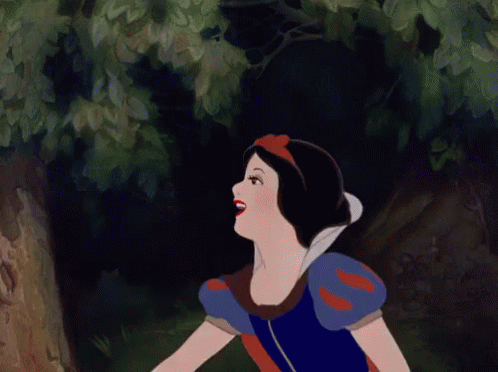
There’s no sign of anything but innocence, no hiding, no disingenuousness—because why should there be? The thing she treasures is a good thing. So that’s what makes her beautiful.
Beautiful enough to be the Fairest of All dressed in rags and dirt.
Beautiful enough to be granted mercy by a Huntsman who’s own life is on the line.
Beautiful enough to be buried in a glass coffin, instead of buried alive when the Queen’s plot succeeds.
Beautiful enough to be searched for and found, against all odds, by the Prince who fell in love with her at first sight.

Someone who values love highly, and lets that treasure shine out through every part of their nature, is powerful. They can strike fear and hatred into the hearts of the most self-absorbed, and transform the most stuck-in-their-ways, and inspire love in anyone who comes into contact with them.
That’s what’s wonderful about Snow White. She’s pure, from what she treasures to her very nature, and needs to hide nothing about herself.
#Snow White#Snow White and the seven dwarves#Snow White and the seven dwarfs#Snow White 1937#Snow White 2024#love#meta#analysis#Disney analysis#Disney appreciation#Disney princess#the one that started it all
429 notes
·
View notes
Note
I'm terribly sorry, but I HAVE to know more about the convergence of spheres and the "don't put Cedric on the isle, fleebag" story. Ur an amazing writer and very complex w with your storytelling! Yoh absolute genius!
I'm so sorry I didn't answer this sooner! I feel terrible...
So, the "Convergence of the Spheres" concept comes from The Witcher series by Andrzej Sapkowski. I'm suuure you've heard of it, lol. I think the whole "Mandela Effect" thing is based on the same concept too. Basically, the idea is that multiple worlds/dimensions get merged together into one.
My theory is that a similar thing happened in Descendants when the United States of Auradon is formed. All of the Disney Kingdoms are transported through space-time to merge into this new world.
Throughout Sofia the First, we see that Sofia is able to contact other Princesses across space-time using the Amulet of Avalor. She gets visited by Aurora (Prince Phillip reveals in Sleeping Beauty that they're in the 14th century) along with Tiana (20th century). Sofia even travels back in time HERSELF when she is called to help Princess Charlotte of Isleworth, who had the Amulet of Avalor before Sofia got it.
Sofia has a connection to all the Disney Princesses and their realms, and her series shows her to have a lot of magical potential. My idea is that a group of powerful magic beings got together and combined their magic to bring all the Disney Kingdoms together, across space-time, to form the continent of Auradon. Main contenders for this group are Sofia the First, Genie, Fairy Godmother, and Merlin: they're all shown to have knowledge of space-time travel.
I think Beast would have been elected King after the formation of the Auradon supercontinent... All the kingdoms would need to be together to vote. So that begs the question: why did this Magical Council decide to create the Convergence? Was it an accident? An attempt to stop some kind of major threat? I haven't figured that mystery out yet. I lean towards the latter: if Beast somehow acted as a hero during this crisis, it would definitely explain why everyone would be so willing to elect him as the King of Auradon.
------------------------------------------------------------------
Now for the Cedric issue. King Beast goes HARD on all the Villains. And not just the Villains either: other media shows that all the minions get sent to the Isle of the Lost too. Even minions who reformed (notably Iago, who reforms in Aladdin 2: Return of Jafar). Everyone is getting punished for their crimes.
You know who that flies in the face of? Sofia. She makes a big point of forgiving Cedric the Sorcerer and allowing him the chance to change. She is NOT going to let him be thrown onto the Isle for crimes of which she already exonerated Cedric (More specifically, her step-dad exonerated Cedric at Sofia's insistence).
Neither King Beast nor Sofia back down, so Sofia leads Enchancia in seceding from Auradon. I imagine several other kingdoms go with them. Maybe Kuzcotopia (Kuzco wouldn't let Kronk, former minion of Yzma, get thrown onto the Isle) and Avalor? This would explain why these kingdoms aren't on the map of the Auradon continent.
Anyway, that's the gist of it. Sorry if this was long-winded. >.<
#Descendants#Sofia the First#Disney theory#King Beast#Auradon#the isle of the lost#disney analysis#disney descendants#descendants wicked world#Avalor#Convergence of the Spheres#Auradon Summit#High King of Auradon#Enchancia
20 notes
·
View notes
Text
If someone ever asks me “Jayce, what’s the most underrated Disney villain in your opinion?” my answer will ALWAYS be Zira from The Lion King 2.
Why?
She’s bent on vengeance because of grief and depression, which has essentially made her insane.
How do I know this?
Listen to her song.
She directly mentions that vengeance soothes her depression “inner kitty.” She manipulates her cubs into going along with this.
Nuka is so desperate to get Zira’s attention that he goes along with her plan to please her. Vitani was likely raised to believe that Simba was in the wrong, and Kovu was raised to “be a killer”. Kovu learns the truth by living with Simba for a while, and Vitani realizes Zira is in the wrong when Kiara brings up the fight at the climax of TLK2 being pointless.
Zira’s doesn’t care about her cubs. She doesn’t care about Nuka until Nuka is crushed by a log. She doesn’t care about Vitani. She doesn’t care about Kovu, only what Kovu can get her and the fact that he looks like Scar (basically she only cares about Kovu because he’s the only part of Scar she has left). Nuka definitely gets the worst of it, but Zira is abusive towards everyone, even her own cubs.
She doesn’t give a shit about Nuka, to the point Nuka calls Kovu a termite. She actively grooms him into believing vengeance is what needs to happen. Zira literally abused Nuka’s eagerness to please.
It’s also worth noting that originally, Zira wasn’t going to slip and fall into the rapids. She was going to jump off and basically commit suicide.
Zira is a fucking nutcase. She let grief, jealousy, and depression drive her insane. She’s past being reasoned with, as seen when Kiara tries to save her life.
Basically Zira is a super fucking underrated villain and My Lullaby is the most underrated Disney villain song of all time.
#the lion king#the lion king 2#the lion king 2 simba's pride#tlk#tlk 2#the lion king zira#the lion king analysis#disney analysis#Spotify#tw suicide mention
15 notes
·
View notes
Text
Portrayal of young people dealing with grief/loss in animated films
TW: Mentions of death/loss, trauma and mental illness
Please beware of potential spoilers for the following films: “The Lion King”, “Brother Bear”, “Frozen”, “Big Hero 6″, “Abominable” (2019)
I recently discovered that the animated films “Abominable“ (2019) and „Big Hero 6“ (2014) both focus on the issue of children/teens/young adults and loss as a kind of main topic and wanted to dive a little further into this subject.
There are two main reasons why I find it very important to discuss this: Firstly, because, at least in my opinion, the public awareness of it is relatively low – this also applies to death in general, being a rather “unpleasant“ subject to talk about, but is especially problematic when it comes to young people, whose problems very often go unnoticed. Secondly, animated films, being mainly targeted at a young audience, could support young people going through difficult times by showing them that they are not alone and maybe even what could possibly help them to deal better with their own problems, besides helping to raise public awareness for these issues. That being said, I selected a couple of animated movies (mainly Disney) from the last 30 years where the topic of loss plays a sufficiently big role. I chose the ones that I know well enough to analyze them and also the ones that I personally found the most interesting, so the choice is definitely pretty subjective and maybe a bit “biased“, but it should be informative nevertheless.
The first film that I‘d like to discuss is Disney‘s classic “The Lion King“ (1994). I‘m well aware that this choice isn‘t unproblematic – after all the main (young) protagonist “Simba“ is a lion, not a human. Since the animals in Disney films are almost always pretty humanized, I decided that it was alright, though. I especially wanted to include that film, because it deals with the combination of loss and trauma – Simba not only loses his father, but also witnesses his death and moreover gets guilt-tripped by his uncle into believing that it was his fault. While this may be a very extraordinary situation, the feeling of guilt is very common when it comes to loss. Simba can only leave the feeling of guilt behind at the end of the film when he learns about the true circumstances of his father‘s demise. It also shows how much these experiences influence Simba later in his life – he doesn‘t feel „worthy“ of being king, he runs away from the rest of his family (which could also be interpreted as secluding himself) and just wants to forget about the past. Only when he (literally) confronts his “inner demons“, he is finally able to make some sort of peace with it. All in all, the portrayal of a young “person“ dealing with loss in this film (although it‘s a rather crass situation) seems pretty accurate and includes some helpful pieces of “advice“ on how to deal with guilt.
The next movie I‘d like to analyze is “Brother Bear“ (2003). Once again, this film doesn‘t (exclusively) focus on humans, but is nonetheless informative since it portrays two experiences with loss which are closely interwoven: On the one hand, young adult “Kenai” has to deal with the death of his brother, on the other hand, the little bear “Koda” loses his mother. Kenai‘s situation resembles the one of Simba – both have to deal with guilt. But whereas his father‘s death isn‘t Simba‘s fault at all, it‘s much more difficult for Kenai to clear himself of being the one responsible for his brother‘s death. The interesting thing is that, whereas Simba takes the blame without questioning it further (probably because he is supposed to be still a “child“ when his father dies), Kenai shifts the blame fully onto the bear that his brother tried to protect him from and which he kills in the process. Later, when Kenai learns that the bear he killed was the mother of Koda, he once again feels guilty, but this time takes on responsibility for it. Koda, of course, is shocked when he learns this, but they both are able to come to terms with the past in the end, finding the family they both lost in each other. This film deals with the especially difficult issue of actually being (at least partly) responsible for someone‘s death – in real life this could, for example, be the case in a car accident. While this might not be that relevant for young people, there is another key message: even after the loss of someone, it is possible to find comfort in other people – be it other family members/relatives or, like in that example, friends.
Another film which I was a little hesitant to include here is “Frozen“ (2013) – while the main protagonists are humans, they are both technically already “adults“ (18 and 21 years old). I finally decided to include it because I personally think that an experience with loss at that age is still pretty difficult. People in their early twenties of course still struggle very much when they lose someone, but at the same time are expected to act all “grown-up“. This is exactly what the film shows: Both Anna and Elsa have to grow up pretty quickly, taking on important responsibilities from one day to the next, most likely without having been properly prepared to do so. While Anna tries to mend the bond with her sister, Elsa shuts herself away from everyone – which is also not unusual when people try to deal with loss. “Frozen” especially focuses on the aspect of relatively young people having to deal with a lot of responsibility – this seems pretty relatable for everyone who has lost one parent or both. But the film also shows another important thing: letting others help you instead of trying to get to grips with everything on your own, is a really important resource in difficult times. This message is especially relevant for young adults, who might feel like that they‘re alone and don‘t have anyone who could support them.
“Big Hero 6“ (2014) and “Abominable“ (2019) are the two films that, in my personal opinion, focus the most on the experience of loss itself. In the other films that I discussed previously, the experience of loss per se wasn‘t really the focal point – more often than not it rather served as a topic to help develop the actual plot. In “Big Hero 6“ 14-year-old Hiro has to deal with the loss of his brother – who seems to have been the only one left of his core family. “Abominable“‘s main protagonist is Yi (who might also be around Hiro‘s age), who has recently lost her father. Both films take the experience of loss as a kind of starting point and the topic stays relevant throughout the whole movie. Both Hiro and Yi have to deal with extraordinary situations (helping an escaped Yeti get back to the Himalayas/fighting a masked villain) that could symbolize them trying to come to terms with the definitely extraordinary situation of their personal losses. Hiro is portrayed showing signs of depression, Yi tries to cope by always keeping herself occupied with something. In Hiro‘s case anger also plays an important role, when he finally finds out who really is responsible for his brother‘s death. Yi rather seems to have to deal with grief, regretting that she never got to travel the country with her father, like they had planned. At the same time, both teens struggle with letting others (friends and family) help them.
This is especially prominent in Yi‘s case: During one scene she is talking about her experiences with her friend Jin, telling him that her mother and grandmother don‘t understand her and that she feels as if they were pushing her away. Jin then asks her whether it couldn‘t be possibly her, that is pushing them away. I think that is an extremely relatable scene – especially young people having to deal with things that are way too “heavy“ for them, often feel as if they were alone, because no one can truly understand them. While this often may be the case, isolating oneself is also a pretty common reaction to experiencing loss – wanting to be left alone to come to terms with everything etc. Yi always carries part of a photo with her, that shows her and her father. At the end of the film, the Yeti that she helped rescue, hands her the other part of the photo – showing Yi‘s mother and grandmother – and puts the two pieces together. This way, Yi finally realizes that she still has a family that loves and supports her – if she lets them. In a similar way, the robot “Baymax“ that was built by his brother, helps Hiro to realize the importance of friendship. In my personal opinion “Abominable“ depicts the topic of young people and grief in the most accurate and realistic way, making it especially relatable and possibly the most “helpful“.
To summarize my previous analysis, a varied set of animated films has, so far, portrayed the various aspects of young people dealing with loss. The different films focus each on different aspects of grieve – especially sadness/depression, anger, regret, guilt, having to grow-up quickly, isolating oneself and (not) accepting help/support. What strikes me as both important and interesting is the way these films approach the issue: Older films like “The Lion King“ and “Brother Bear“ only dealt with the topic “in disguise“. Not only that the main protagonists were (partly) animals, but the aspects of loss and grieving weren‘t really the focal point of the plot. This is what, in my opinion, makes the two most recent films “Big Hero 6“ and “Abominable“ special: A quite young protagonist trying to come to terms with their loss is basically the central theme of both films. In contrast to the older films, these two movies approach the topic more openly, depicting things like depression or showing funeral scenes (the latter also applies to “Frozen“). I personally interpret that as a kind of shift in film-making, especially Disney seemingly becoming “bolder“ as time goes by and no longer producing only “feel-good-movies“, but also films dealing with serious topics - not only mentioning them but actually making them a main theme of the plot. This is especially important since animated films are not only ideally suited to portray “difficult“ subjects in a way that is suitable for young people, but also to show them ways to deal with their own problems and therefore help and support them during severe crises, especially when they lack people to support them in real life. Besides, such films can play an important role in awareness raising.
#disney analysis#the lion king#brother bear#frozen#big hero 6#abominable (2019)#disney theory#tw: death#tw: loss#tw: grief#tw: trauma#tw: mental health#tw: mental illness
12 notes
·
View notes
Text
Starting Sleeping beauty with some friends for my Disney princesses analysis

We are watching movies every week and this time the group decided to watch Sleeping beauty so I'm taking advantage of it!
Not my favorite though. But we'll see. At least the villain is cool but the topic of the analysis is Aurora, not her. Well, let's try! Maybe she'll surprise me.

4 notes
·
View notes